Why Do Dogs Hide Their Treats and Toys?
Mostly, a dog’s hiding behavior is normal and shouldn’t be a cause for worry.
These dogs are likely functioning on a survival skill to keep their most prized possession, which in this case, are treats and food.
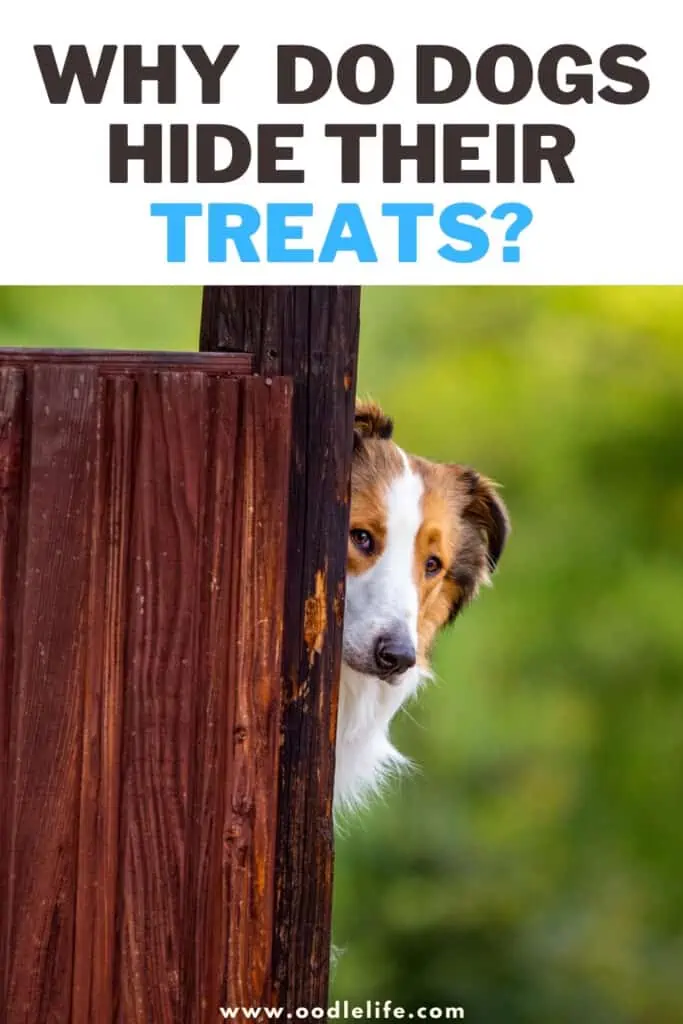
But if you’re worried, read through this article to read about other causes and learn how to deal with such situations!
Causes of Hiding Treat
There are various good reasons as to why dogs hide their treats. Most of them are not alarming, but it helps to know the root cause of the hiding behavior.
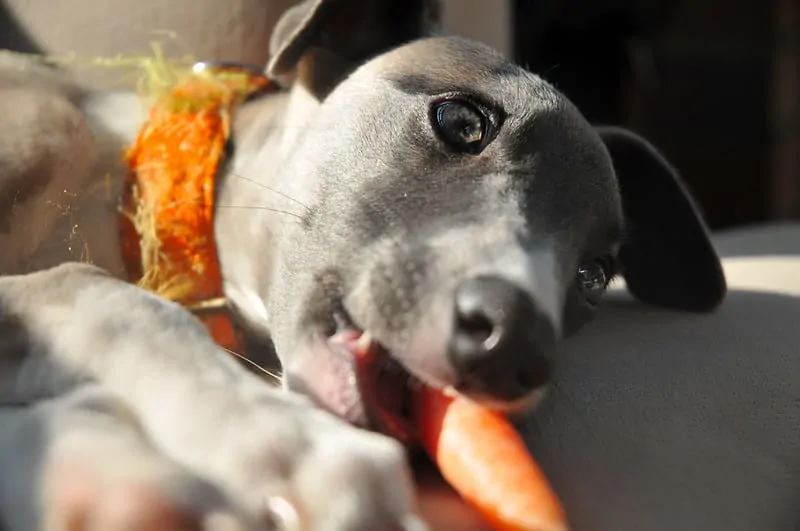
It’s Your Dog’s Instinctual Behavior / Natural Instinct
If you have domesticated dogs, hiding food and treats must be a natural instinct. It’s a canine survival strategy.
In the wild, dogs and animals hunt and compete over food. A wild dog turned into a pet won’t change its behavior and natural instinct overnight.
Even if they are transferred to a new environment, the natural instincts to hide things may be carried over.
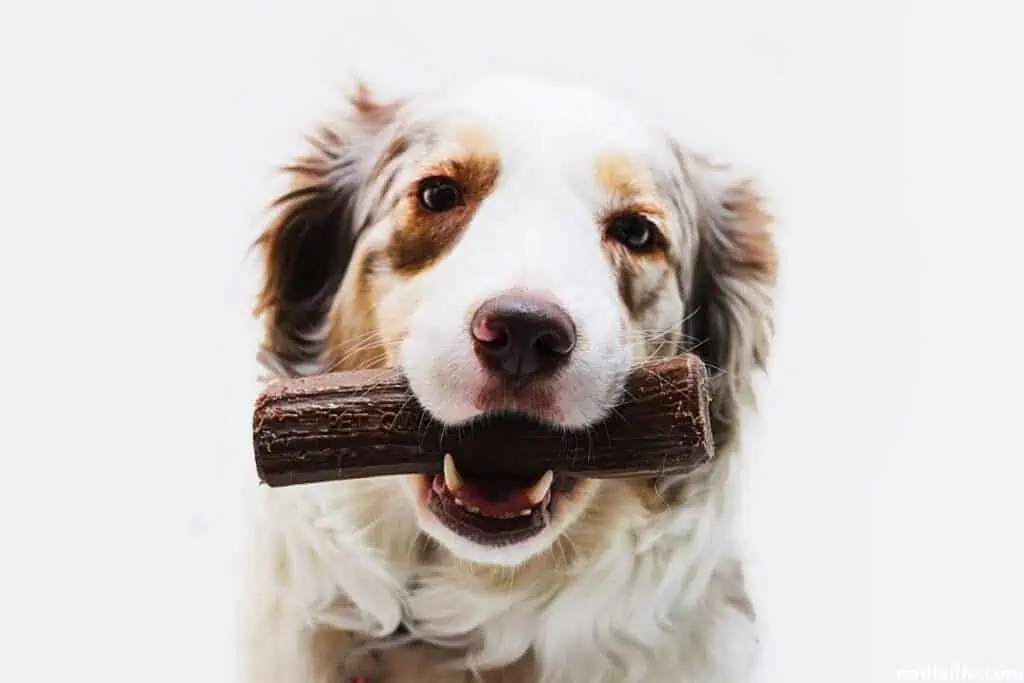
Your Dog May Be Undergoing Anxiety or Stress
The behavior of dogs hiding things is also an indicator of anxiety.
If you live in a multi-pet household and notice that the hiding behavior develops, there may be some competition among them.
It could be that the older dogs bully the new pup, so it feels the need to hide their treats and eat them somewhere safe.
This is also true with a rescue dog who came from stressful environments.
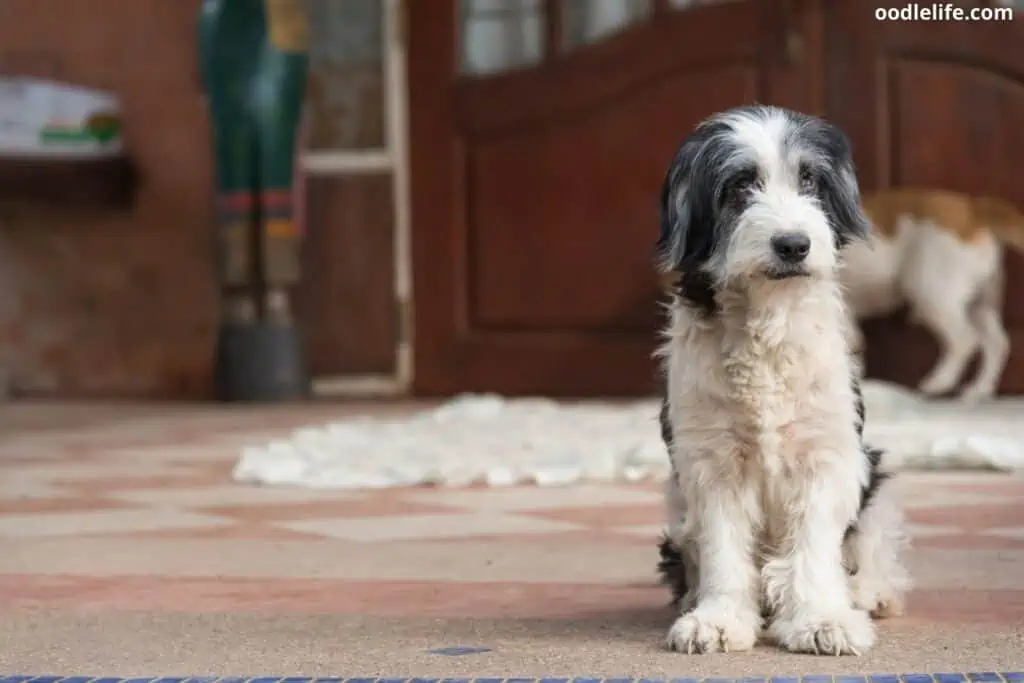
You’re Over Feeding Your Dog
For us humans, it’s exciting it is to spoil your dog with their favorite treats. We understand! But giving them excess food is also unhealthy for them.
If your dog didn’t come from a bad past, and they don’t seem to have reasons to be overprotective of their food and treats, you may want to look into the possibility of over-feeding.
Dogs tend to become bored with repetitive treats, so they hide them later or for the next meal.
On the other hand, dogs that don’t hide treats and are constantly over-fed are at risk for obesity.
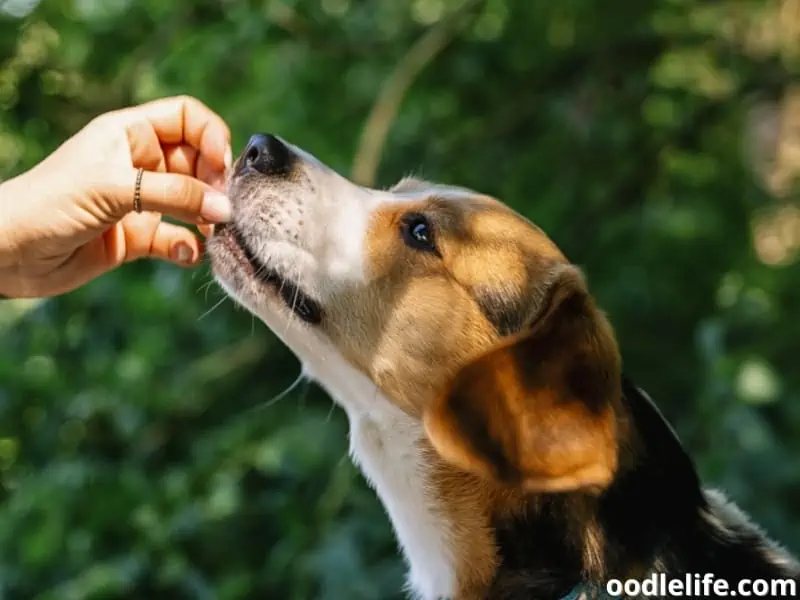
They’re Bored/Seeking Attention
It’s also possible that your dog is bored and asking for your attention. Of course, when you see treats, toys, and food lying around the house, you’ll shift your attention to them.
Once our canine friends figure out this pattern, they will be conditioned to keep hiding items to grab your focus.
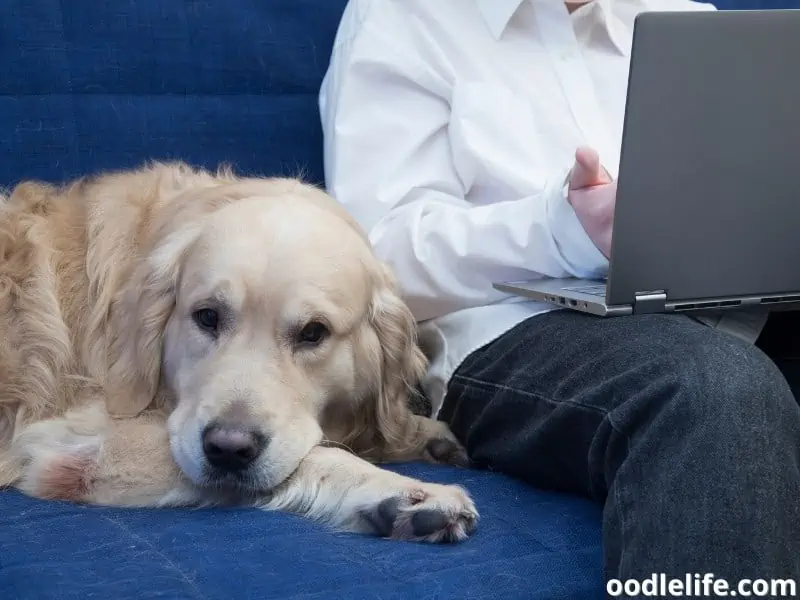
Your Pet Has a Possessive Behavior
Does your dog bury things in your backyard? Does your dog hide treats constantly? Does your dog hide other things too?
Well, when you often see them digging in the backyard to bury their food, treats, toys, and bones there, it’s a sign of possessiveness.
While this isn’t a rare case, it’s best to get rid of this behavior as it may lead to bigger problems in the future.
Soon enough, they will be hiding things that are not meant to be toys and cause you a lot of stress!

How to Identify the Right Causes?
These reasons are all valid. However, determining the actual cause is still on a case-to-case basis.
For instance, just because your dog is a little thick doesn’t mean you’re overfeeding them. Or, not all rescue dogs are undergoing stress.
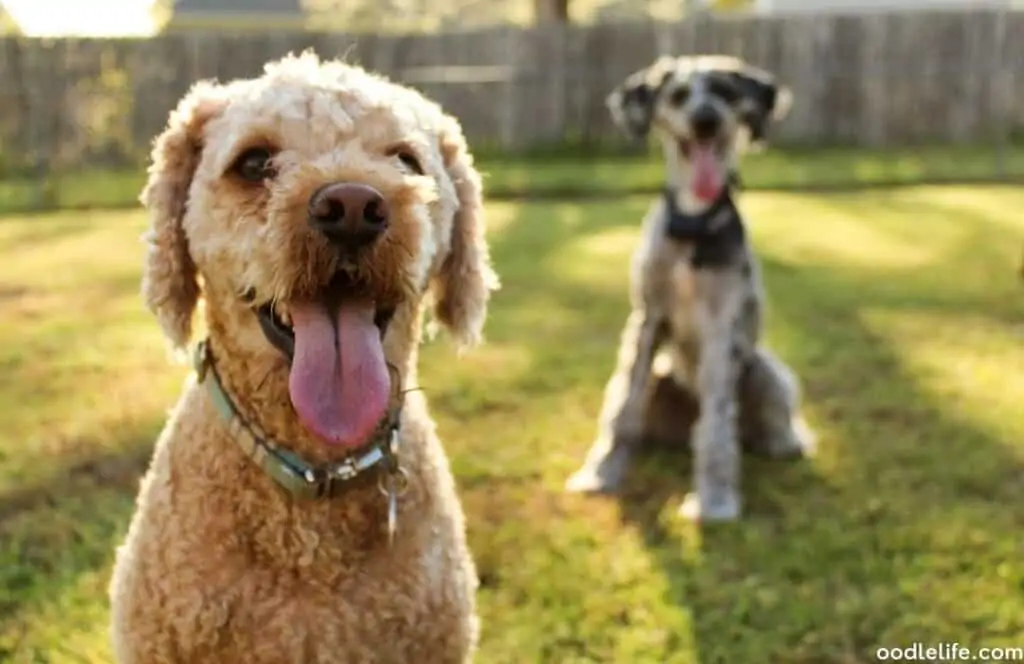
Observe the Situation, Find the Triggers
Observe how they deal with other pets. If you see them acting normal alone but changing behaviors when other animals approach them, that’s probably the cause of their anxiety.
When they don’t hide food and treats at home but do so in another house, they probably don’t trust the change of environment and feel the need to protect the treats.
The Onset of Hiding Behavior
Timing is also a good indicator. Knowing when the behavior started can point out the key factors, helping you address them better.
If your dogs hide things since they were born, this must probably be their natural behavior beyond external factors.
It’s also highly plausible that it’s one of the bad habits formed due to lack of training.
Consult Your Veterinarian
Though your vets will probably tell you the first two points as well, they may be able to give you specific tips based on your dog’s needs.
Their professional experiences can help you identify these problems faster.
How to Control the Hiding Behavior?
The good news is that you can train dogs. If these behaviors drive you nuts, you can always condition them or have them professionally trained.
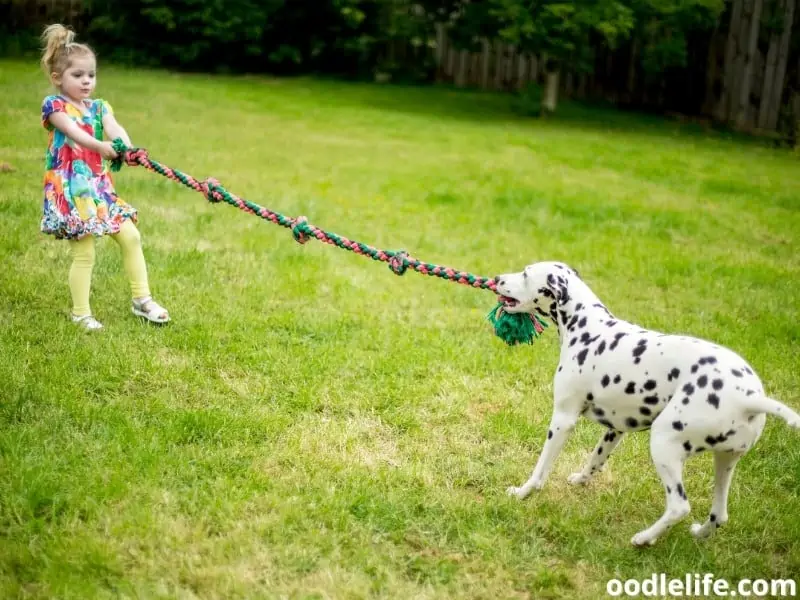
Don’t Over Feed Your Dog
If you suspect that you tend to feed them too much food and treats, stop doing it even if they ask for it! Dogs can’t control themselves until they get sick, so as humans, be the ones to control it for them.
Train Your Dog With Playtime
Playtime is always perfect for training and tricks. Using their treats, teach them to stop hiding their toys and treats elsewhere. Here are some cues to practice:
- When your dog starts to hoard and hide their treat, reprimand the action.
- When your dog brings back a treat, reward them with positive reinforcement.
- When your dog puts their toys in the proper place, reward them .
- When your dogs eat and finish their food at once, praise and reward them.
Schedule Their Meals
With a fixed schedule, your dog will understand that there’s a specific timeframe for eating.
This also allows you to watch them finish their meals and take the necessary actions to condition them.
Going back to the cues above, you can follow them with a scheduled mealtime.
Try the Dog Toys for Treats
There are now toys that let the dog look for the treats before eating them. It’s entertaining for them, and they get rewarded!
If you think that dogs hide treats due to boredom, consider getting them these. Additionally, it trains them and tests their IQ, which is also a healthy practice.
Remove the Triggers
If you want to get rid of the behavior, don’t tempt your dog with toys lying around everywhere. Take the first step and hide the potential toys and other things in their proper places.
It will also help keep your dog away from areas where there are a lot of spaces to hide treats in. Those nooks and crannies are the perfect places for a hiding spot.
To train them, put them in an open space where there’s nowhere to hide the treats, toys, and food.
Keep Your Dog Away From Other Animals Until Ready
As we mentioned, being with other living beings can stress them out. Dogs may hide treats and food out of anxiety, or the other animals are not kind to them.
If possible, separate your dog while they’re still getting used to the surroundings. You should also take the extra effort to slowly ease them in and teach them the proper way to eat.
Don’t Yell, Hit, or Create a Fuss
The thing with dog training is that there are tones to follow. Since they don’t communicate with us using words, they sense the manner of your talking voice and identify whether you’re happy or angry.
Yelling and hitting them doesn’t help. Creating a fuss will only rouse up your dog and make them think that you’re playing with them. Avoid negative reinforcement and positive punishment.
Send Them to Dog School or Professional Trainer
If you’re inexperienced, the training may be ineffective.
Don’t get frustrated! You can send them to trainers. Dogs tend to come back more behaved after a few sessions.
Another tip for owners with dogs that are wild by natural instinct and used to hunt food for survival is you may need a professional to handle them.
You can’t control natural instinct for survival on your own at home.
Why You Need to Reverse These Behaviors?
You may not see the occasional digging to bury bones and food as an upfront problem, but letting them get used to these habits will be harder to reverse as they grow older.

It’s Chaotic and Messy
Can you imagine living in a house where there’s food, bones, and toys lying around on your bed, sofa, carpet – everywhere?
It’s unhygienic and not ideal for a home. If you have children or babies, that will be dangerous.
Instead of constantly cleaning up after your dog, attack the problem at the root cause, which is poor behavior.
It Leads to Other Bad Habits
Today, they hide food crumbs and bones. Tomorrow, it’s a pair of slippers. The next day, it’s your expensive jewelry. Do you see where we’re going with this?
If you don’t control your dog at an early stage, you are only encouraging them. They don’t see anything wrong with it, so why stop?
For the Well-Being of Your Dog
Dogs hide treats when stressed. It may also be a sign that your dog is not thriving well in the surrounding, or the living situation is not suitable for them.
If this is ignored, the stress can lead to depression.
Your dog might eventually eat less and stay in bed more. When dogs eat and move less, they get sick.
So, when your dogs hide things, think of it as a symptom to address. Don’t simply ignore the situation.
Why Do Dogs Hide Their Treats?
Dogs tend to hide their treats and toys because of:
- Natural instincts
- Anxiety/Stress
- Overfeeding
- Boredom/Attention-Seeking
- Possessive Behavior
You can correctly identify the causes by observing the situation, looking for the triggers, and consulting an expert.
Once determined, here are some corrective measures:
- Stop overfeeding
- Train with playtime and toys
- Schedule meals
- Remove the triggers
- Keep the dog away from other animals
- Don’t yell, hit, or create a fuss when training them
- Send them to a professional trainer
You must find solutions for this behavior to avoid a chaotic and messy home, prevent the habit from forming other bad ones, and for the well-being of your dog.
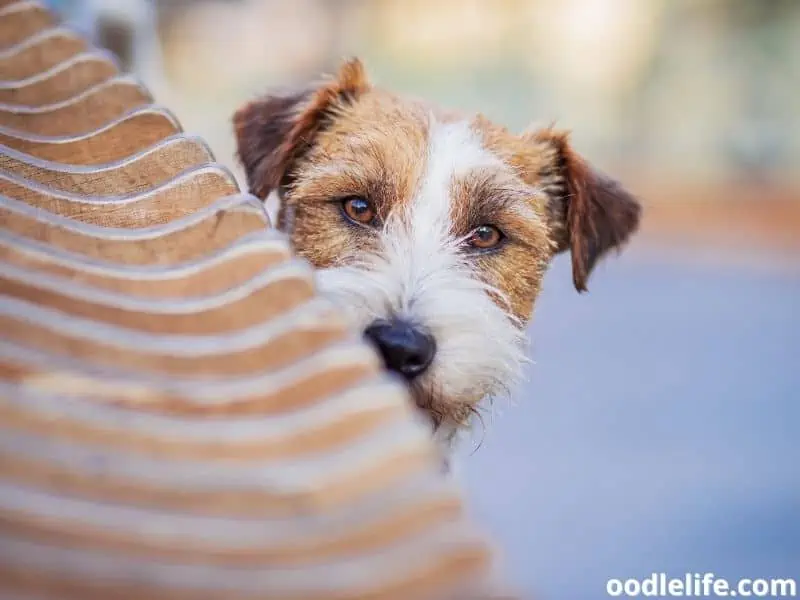
Conclusion
Don’t get too frustrated when your dogs display hiding behaviors but don’t ignore them.
The middle-ground is looking for interventions to correct the problem and let your dogs enjoy themselves as much as possible.
After all, you’re their fur-ever home.
Good luck!